Not every inhabitant of our country has ever tasted an unusual vegetable with an equally unusual name - artichoke. Despite the fact that the history of this outlandish flower as a food product has been going on for several millennia, some artichokes still cause bewilderment and many questions: "how can you eat thorny flowers?", "Why add them to salads, soups and even baked goods? "," Where are so many useful vitamins and minerals in an ordinary flower? " So, artichoke: what kind of animal is it and what is it eaten with?
Content
Background
One of the many ancient Greek legends tells of a young girl named Tsinara who lives on the island with her family. Once Zeus, visiting Poseidon, saw her on the coast of the island of Zinari, walking alone. For a long time, Zeus simply watched the girl until Tsinara noticed him. The loving Zeus, who won the hearts of many women, seduced her too, and then offered to live with him on Olympus and become a goddess on one condition: the girl must forever forget about her relatives and not seek a meeting with them.
Tsinara accepted the offer of the Thunderer and the two of them went to Olympus. At every opportunity, in secret from his wife Hera, Zeus visited his beloved, but something did not give the young goddess peace. The girl could not come to terms with the impossibility of meeting her relatives and, contrary to Zeus's order, ran away to meet with her family.
Zeus got angry and decided to teach the disobedient mistress a lesson. As soon as Tsinara returned, he threw her from Olympus to the ground. As soon as the girl's body touched the ground, the incredible happened: nothing remained at the place of her fall, except for a beautiful flower, which was named after her.
The plant Cynara scolymus, better known to modern humans as artichoke, translated from Latin means "dog's teeth". Indeed, the sharp leaves and fruits of the flower outwardly resemble fangs.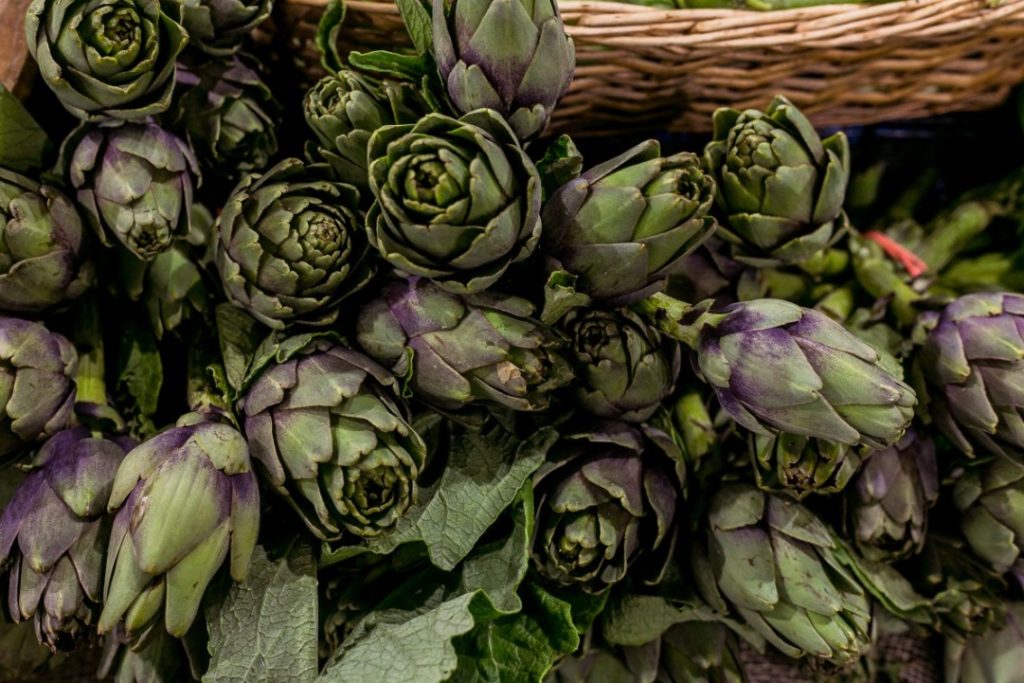
Interesting Facts
- The artichoke was first described by the Greek naturalist Theophrastus, who lived from 371 to 287 BC. This suggests that Tsinara has existed for more than 2 millennia!
- The ancient Greeks and Romans ate Cinara to increase their sex drive. It was believed that the roots of the plant were "provocateurs of Venus", helping to make a woman more desirable for a man.
- The ancient Greeks considered the artichoke a magic flower, the reception of which guarantees the birth of boys.
- In France, the artichoke has long been a banned product. It was believed that he provokes already loving French women to sexual frenzy. However, Maria de Medici did not observe this law: she was an ardent lover of Tsinara.
- The overeating Roman rich used the vegetable as a remedy for the stomach and liver.
Artichoke
A plant belonging to the Aster family, as already mentioned, has two names. The flower received its modern name thanks to the Arabs, who called it the phrase "arti shauki", which means "earthen thorn".
In nature, there are about 10 species (with many subspecies), but only half of them are suitable for consumption.It is not entirely correct to mention the term Cynara scolymus as a generalized name for artichokes: cinara scolimus (real artichoke) is just one of the varieties of artichokes, but this particular species is widespread and is the basis for the selection of many subspecies used for food (large green, early purple, May 41, Laon, Maikop, etc.) Cynara cardunculus or Spanish artichoke is popular along with real or sowing. This species grows in Europe and Asia, its distinctive feature is that, unlike the scolymus species (in which only unopened buds are suitable for food), cardunculus has edible not only buds, but also petioles with a part of the root.
In addition to the most edible species, the following can be distinguished:
- Baetica;
- Cornigera;
- Algarbiensis;
- Auranitica;
- Cyrenaica;
- Humilis;
- Tournefortii;
- Syriaca.
Traditionally, the Canary Islands and the Mediterranean region are considered the birthplace of artichokes, but many species grow in other territories. The flower grows preferably in arid and warm areas.
In some countries, such as Australia, the artichoke is considered a weed and is destroyed in huge quantities.
Cooking applications
In cooking, the artichoke is considered a delicacy vegetable. It is eaten in various ways:
- Raw;
- In the form of canned food;
- Boiled, etc.
Depending on the variety and species, an unopened flower bud, a petiole (leaf) and some parts of the root may be suitable for food. For conservation, small or medium-sized unopened buds are used. If the leaves of the fruit have acquired a brownish tint, you have an old inflorescence in front of you - an unfit food product. The young inflorescence has leaves of a green or yellowish tint.
Artichokes are used for cooking such dishes as:
- Salads;
- Soups;
- Hot dishes (fish, meat);
- Pizza;
- Addition to side dishes and casseroles;
- Desserts.
Separately, mention should be made of the Mediterranean diet, in which artichokes are an integral part of the diet. They are consumed both raw and canned, but a lot of attention is paid to salads with pickled fruits.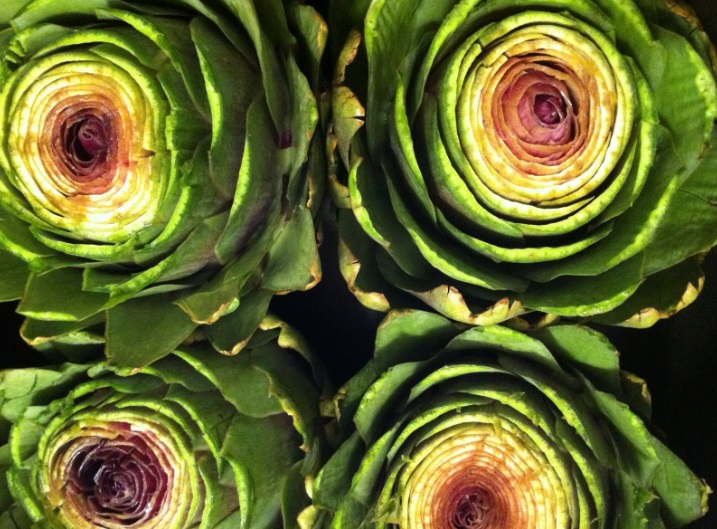
Calorie content and composition
One of the most pleasant benefits of canned artichokes is the preservation of the vitamin and mineral composition. Fresh fruits contain about 88-90% water in their composition, while in canned form the concentration of liquid becomes less, and the percentage of nutrients increases. The calorie content of the canned product is 116 kcal per 100 g, where (in an approximate ratio):
- Protein - 23 kcal;
- Fat - 36 kcal;
- Carbohydrates - 75 kcal.
Energy ratio (%): 20/31/65 (b / w / y).
The average weight of a can of canned artichokes is 250 g.
The traditional conservation process is not much different from that used by the ancient Greeks. The main ingredients for curling are oil and vinegar (and the vegetable itself, of course). The product is canned in glass jars, but on the Internet you can also find a product enclosed in iron containers (for example, the Italian company “ITALCARCIOFI” sells canned food in its own juice in iron cans).
The vitamin composition of canned food deserves special attention. Unaccustomed, you may not even believe that there can be so many useful substances in a canned product! So, in the composition:
- Vitamins (PP, C, B9, B2, A, B1);
- Minerals (Al, Co, B, Mo, F, Mn, Cu, I, Zn, Fe, S, Cl, P, Mg, Ca, Na, K).
If you include this product in your daily diet, you may no longer need vitamins!
The best brands of canned artichokes
You can buy canned artichokes in several ways: in a store, online, as a presentation from friends who have visited foreign countries. The most profitable way is online and preferably in bulk, since most major suppliers offer good discounts when buying 10, 12 or more cans at the same time. Canned food is a long-lived product, so you don't have to worry about the product being lost.
In 2020, the leading positions in the sale of canned artichokes are occupied by large companies that are known to us from previous years.Greece and Italy have been the leaders in the production of this product for a long time.
Delphi
Under the Delphi brand, the Greek company E&D KONTOS S.A. produces canned food, which are known throughout the world. Delphi has firmly established itself as a leader in the production of premium canned fruit and vegetables.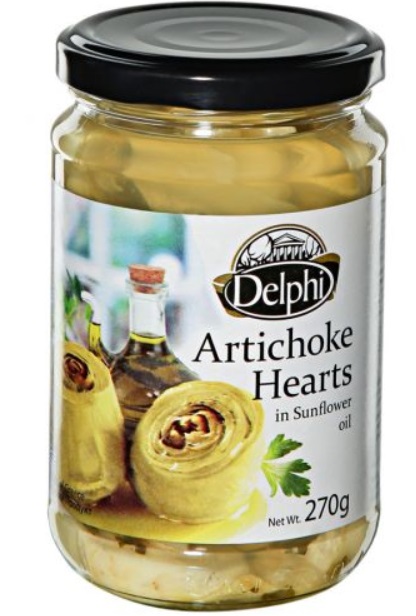
- Country: Greece;
- Packing: Glass jar;
- Weight: 270 g, 3000 g;
- Average price: 380 rubles, 2990 rubles;
- Calorie content: 160 kcal per 100g. product;
- Expiration date: 3 years from the date of production, after opening - 15 days;
- Storage conditions: in a cool place at a temperature not exceeding 25Cabout.
Cooking method and composition:
The company produces canned artichokes according to a traditional Greek recipe using oil and spices. For cooking, medium-sized fruit hearts are used.
Benefits:
- The minimum set of additives in the composition;
- Possibility to choose between small (270g) and large (3000g) volumes.
Disadvantages:
- The glass jar is unreliable during transportation (in terms of online ordering);
- There is no discount when buying in bulk.
Le Bonta
The full name of the brand is Le Bonta del Casale, which means "rustic yummy". It is a healthy, ecological and tasty product prepared according to old country recipes.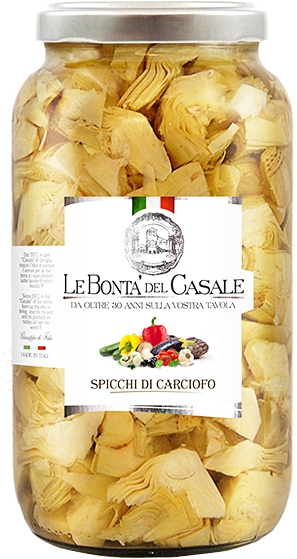
- Country: Italy;
- Packing: Glass jar;
- Weight: 314 g;
- Average price: 461 rubles;
- Calorie content: 160 kcal per 100g. product;
- Expiration date: 24 months. from the date of production, after opening, use within 20 days;
- Storage conditions: in a cool place at a temperature not exceeding 25Cabout.
Composition and preparation method:
The composition contains the minimum amount of ingredients. More than 60% are occupied by the hearts of young inflorescences, 35% - butter, a little wine vinegar, ascorbic and citric acid.
On many sites, these jars are presented as vegan products.
The instruction says that the product is prepared in the best traditions of Apulian cuisine. Few people know what this name means. Apulian cuisine is rarely found in cafes or restaurants. In fact, Puglia is a region in Italy that occupies its eastern part. In this place, Greek traditions are manifested most strongly, therefore, the local cuisine is imbued with the Greek spirit through and through.
Benefits:
- Unusual recipe;
- Very popular in the circles of lovers of healthy food and eco-products;
- Laconic composition;
- Good value for money.
Disadvantages:
- Glass jar;
- Buying in bulk is impossible, since the product is sold out very quickly when it appears in the store;
- Only one volume (314g).
ALREEF
ALREEF company is engaged in the production of products for a healthy diet. They are firmly established in the market as suppliers of quality olive and vegetable oils. One of the main advantages is the price of the supplied products. In online stores, they occupy the leading lines in terms of product affordability.
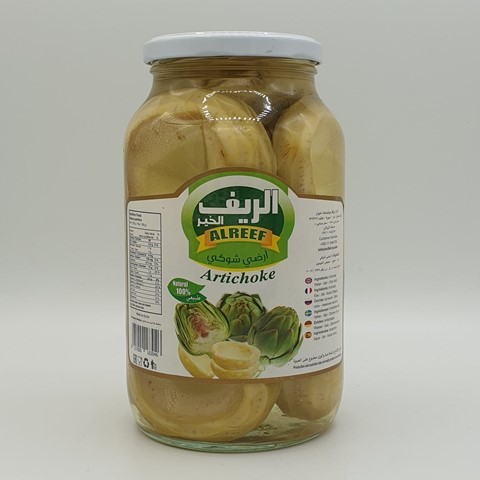
- Country: Syria;
- Packing: Glass jar;
- Weight: 1250 g;
- Average price: 585 rubles;
- Calorie content: 60 kcal per 100g. product;
- Expiration date: 24 months. from the date of production, after opening - 15 days;
- Storage conditions: in a cool place at temperatures from +5 to + 25Cabout.
Composition:
The product is distinguished by its purest composition without the addition of unnecessary acids and vinegar: in addition to the main ingredient, it contains salt, water and a little citric acid as a preservative. However, such a product can play a bad joke with the buyer and deteriorate even before the can is opened. Storage and shipping instructions must be carefully followed to avoid misunderstandings.
In culinary circles, it is believed that the purer the composition of canned artichokes, the better they add to salad.
Benefits:
- The minimum amount of additives in the composition;
- Pure taste of vegetables;
- Very good price.
Disadvantages:
- Glass containers;
- Availability of goods only in large quantities (1250);
Piacelli
Piacelli is one of the largest German food brands. In Russia, he is best known as a supplier of juices and sauces, but this is not the whole range of the company.In Piacelli's "suitcase" there are essential foodstuffs, as well as confectionery, groceries, canned food, high-quality pasta, juices, sauces, etc.
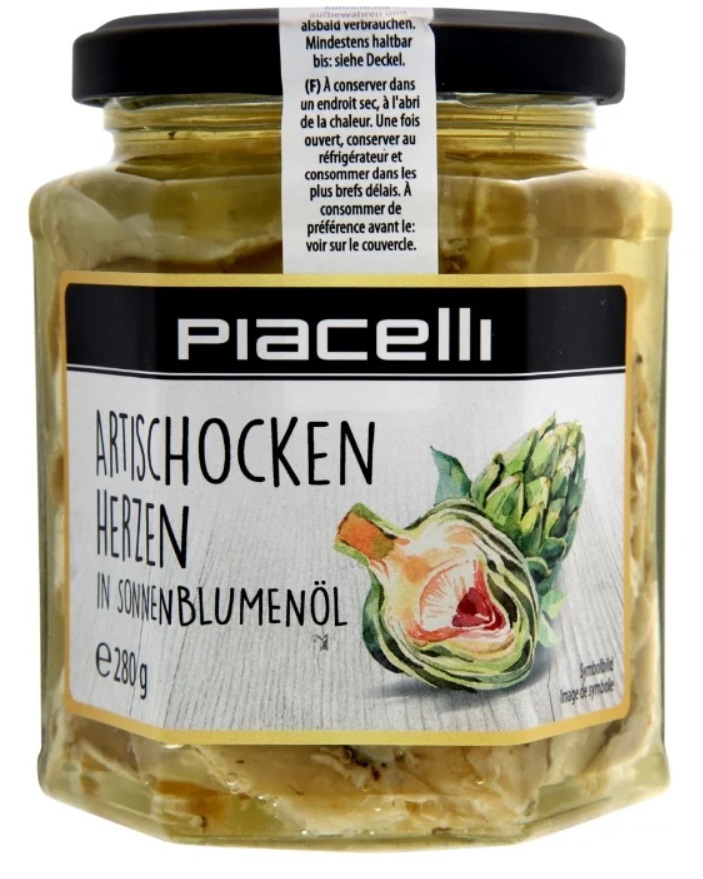
- Country: Germany;
- Packing: Glass jar;
- Weight: 280 g;
- Average price: 375 rubles;
- Caloric content: 108 kcal per 100g. product;
- Expiration date: 24 months. from the date of production, after opening - no more than a week;
- Storage conditions: in a refrigerator at a temperature from +5 to + 25Cabout.
Composition and preparation method:
Sliced artichokes in sunflower oil with the addition of a special ingredient - piacelli herbs. In the composition, in addition to 57% of the content of cut inflorescences, citric acid as an acidity regulator, ascorbic acid as an antioxidant, salt, parsley, cognac vinegar and sunflower oil. All this is flavored with herbs.
Benefits:
- You can even find it in the store;
- German impeccable quality;
- Small volume and the possibility of ordering in bulk at a discount.
Disadvantages:
- "Average" price for small volume;
- There are many additives in the composition.
Casa Rinaldi
Casa Rinaldi is an Italian manufacturer of canned vegetables, oils, sauces, sweets and pasta. The company focuses on manual production. Almost every product under this brand has its own flavor.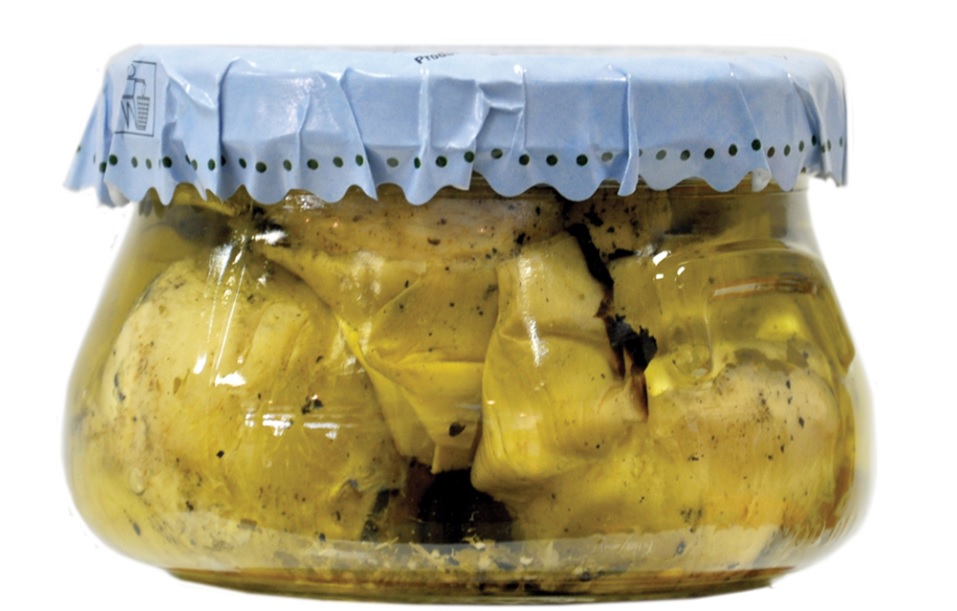
We must pay tribute to the originality of the packaging of canned food. The jars have a non-standard "pot-bellied" shape, and on top they are decorated with decorative paper - a cap.
- Country: Italy (Lazio);
- Packing: Glass jar;
- Weight: 320 g;
- Average price: 990 rubles;
- Caloric content: 110 kcal per 100g. product;
- Expiration date: 3 years, after opening - 7 days;
- Storage conditions: in a refrigerator at a temperature not exceeding 25Cabout.
Composition and preparation method:
The composition of the product is similar to that of most Italian manufacturers. In addition to the main ingredient, there are vinegar (tartaric), acid (ascorbic and citric), oil and salt. On the back you can read that the jar contains pre-grilled artichokes hand-picked in the Italian region of Lazio.
Benefits:
- Original and beautiful packaging;
- Normal composition.
Disadvantages:
- Glass jar;
- Very expensive.
BELSUN
Belsun is one of the few canned food companies that supplies artichokes not only in glass jars, but also in tin packaging.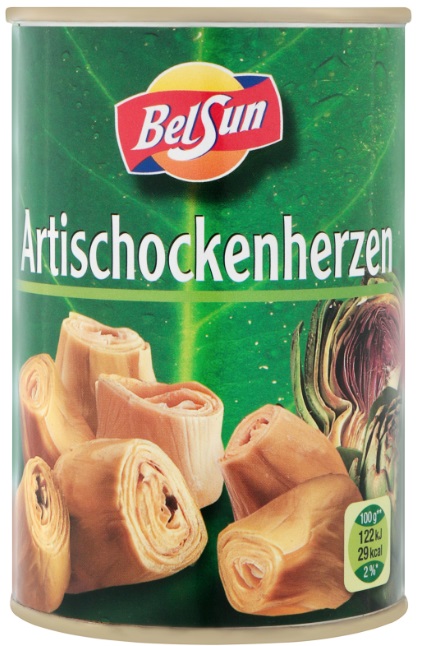
- Country: China;
- Packing: Glass / tin can;
- Weight: 425 g. 400 g (tin container);
- Average price: 225 rubles. (with a wholesale order of 12 cans - a discount);
- Calorie content: 60 kcal per 100g. product;
- Expiration date: 24 months. from the date of production, after opening - no more than a week;
- Storage conditions: in a refrigerator at a temperature from +0 to + 25Cabout.
Storage conditions:
The instructions for tin-packed artichokes indicate that from the moment of opening the product must be consumed within 3 days. After this time, eating artichokes is unacceptable. Therefore, you need to pay special attention not only to the appearance of the product at redemption, but also to the contents of the can at opening. If transported incorrectly, canned food could go bad.
Benefits:
- The ability to order in bulk with a discount of 12 cans;
- Low price;
- Choice of packaging (glass or iron);
- Simple composition.
Disadvantages:
- Short shelf life of an open can.
Delicious young artichokes in our stores are a fantastic luxury. Therefore, lovers of healthy and wholesome food have to look for a product on the Internet or find an alternative to such a purchase. An excellent substitute for fresh artichokes is canned young inflorescences. The artichoke does not lose its beneficial properties during the conservation process, therefore it is perfect both in addition to daily meals and as an independent product.












